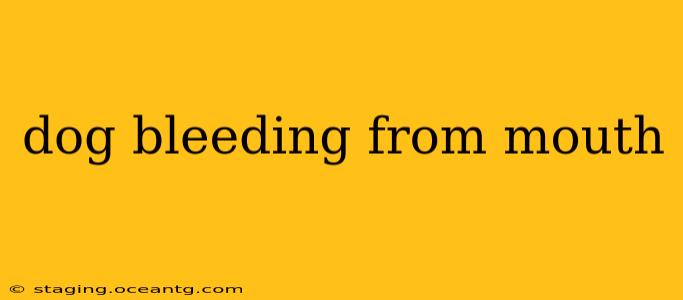Seeing your dog bleeding from the mouth is understandably terrifying. It's a serious situation that requires immediate attention and careful assessment. This comprehensive guide will help you understand the potential causes, when a veterinary visit is crucial, and the steps to take in such an emergency.
What Could Be Causing My Dog to Bleed From the Mouth?
The causes of oral bleeding in dogs are diverse, ranging from minor injuries to serious medical conditions. Some common reasons include:
- Trauma: This is a frequent culprit. A fall, fight, or impact to the face can cause cuts, broken teeth, or injuries to the gums and tongue, resulting in bleeding.
- Dental Disease: Periodontal disease (gum disease) is widespread in dogs, and advanced stages can lead to bleeding gums. Infected teeth can also cause bleeding.
- Ingestion of Foreign Objects: Dogs are notorious for swallowing things they shouldn't. Sharp objects can puncture the mouth or throat, causing bleeding.
- Coagulation Disorders: Problems with your dog's blood clotting ability can result in prolonged or excessive bleeding from even minor injuries. This requires immediate veterinary attention.
- Cancer: Oral tumors, though less common, can cause bleeding and other oral abnormalities.
- Poisoning: Certain toxins can cause oral irritation and bleeding.
- Inflammatory Diseases: Some autoimmune diseases can affect the mouth and cause bleeding.
My Dog's Mouth is Bleeding – How Serious Is It?
The severity depends entirely on the cause and amount of bleeding. Seek immediate veterinary care if:
- The bleeding is profuse or doesn't stop. This indicates a potentially serious injury or underlying condition.
- Your dog is exhibiting other symptoms, such as lethargy, weakness, difficulty breathing, or swelling.
- You suspect poisoning. Timely intervention is vital in poisoning cases.
- The bleeding is accompanied by visible injury, such as a deep wound or broken tooth.
What Should I Do If My Dog is Bleeding From the Mouth?
1. Remain Calm: Your dog will sense your anxiety, so try to stay calm and reassuring.
2. Assess the Situation: Carefully examine your dog's mouth (if safe to do so) to identify the source of the bleeding. Try to note the amount and type of bleeding.
3. Control the Bleeding (if possible and safe): For minor bleeding, you can try applying gentle pressure with a clean cloth to the area. Do not attempt this if the bleeding is profuse or if your dog is aggressive or distressed.
4. Transport to the Vet: Get your dog to a veterinarian as quickly as possible. If the bleeding is severe, call your vet or emergency animal hospital beforehand to let them know you are coming.
How Can I Prevent My Dog From Bleeding From the Mouth?
Preventive care is key:
- Regular Dental Checkups: Schedule regular dental cleanings and examinations with your vet to detect and address dental problems early.
- Proper Diet: A balanced diet can contribute to healthy gums and teeth.
- Safe Environment: Keep your dog away from potential hazards that could cause oral trauma.
- Supervise Chewing: Monitor your dog while they are chewing on toys or bones to prevent injuries.
What are Some Common Oral Problems in Dogs?
This question often arises because understanding common issues can help prevent future problems. Common oral problems include periodontal disease (gingivitis and periodontitis), broken teeth, tooth resorption, oral tumors, and foreign body ingestion. Regular veterinary checkups and good oral hygiene are crucial for preventing these issues.
My Dog is Bleeding From the Mouth After a Fight – What Should I Do?
If your dog is bleeding from a fight, assess the severity of the injuries. Even seemingly minor wounds can become infected. Immediate veterinary attention is crucial to clean and treat any wounds, assess for internal injuries, and administer necessary antibiotics or pain relief.
When Should I Call an Emergency Vet for My Dog's Mouth Bleeding?
You should contact an emergency veterinarian immediately if the bleeding is profuse, doesn't stop, your dog shows signs of distress (lethargy, weakness, difficulty breathing), or if you suspect poisoning or a significant injury. Don't hesitate; prompt veterinary care is crucial in these situations.
This information is for general knowledge and does not substitute professional veterinary advice. Always consult your veterinarian for any concerns about your dog's health. The safety and well-being of your canine companion are paramount.
